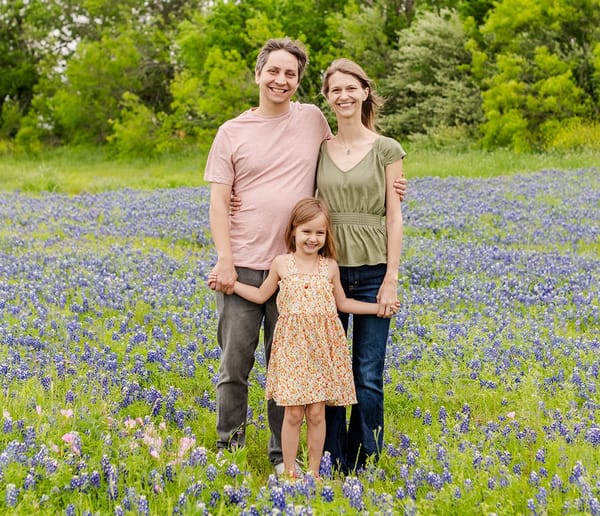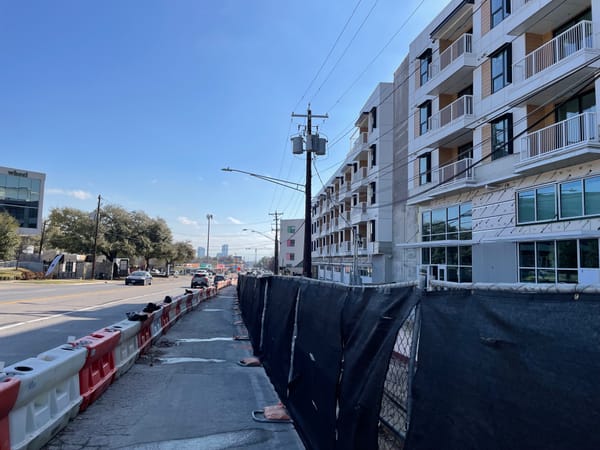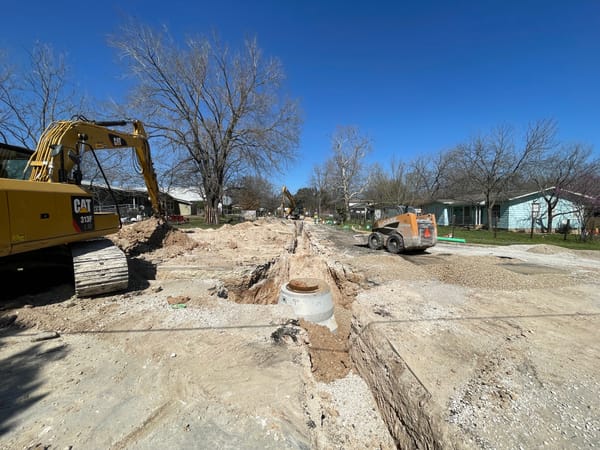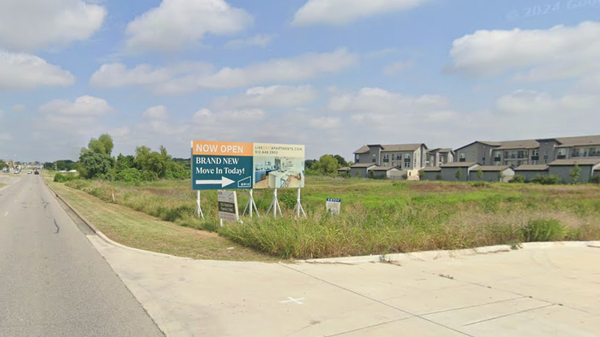Why is Council taking this deal?
The hotel industry's bait-and-switch.

Tomorrow City Council is being asked to approve a Tourism Public Improvement District sought by the city's largest hotels. It is being framed as a good deal for the tourism industry and the city of Austin, but it is a far cry from the deal that the hotels had signaled support for in past years.
To get a sense of how different the deal on the table is from the previous one, I talked to former Mayor Steve Adler, who championed the TPID as a way to create a permanent funding stream to combat homelessness.
We were promised 40% for homelessness
As Adler recalls, the hotel industry came to the city asking for the TPID, which levies a 1-2% assessment on all large hotels, as a way to generate more money for tourism and convention marketing. At the same time, the industry was also lobbying City Council to approve an additional 2% hotel tax to fund an expansion of the Convention Center.
Adler seized on their requests as an opportunity to generate funding for a problem that represented a serious challenge to both the local tourism industry and the city as a whole: the rapidly growing homeless population.
As early as July 2017, the former mayor was pitching the TPID, along with a Convention Center expansion, as key parts to solving what he described as the "downtown puzzle." The hotel industry had signaled its support for allocating up to 40% of a TPID to the city to address homelessness.
The industry was receptive to an initial 1% assessment that would yield an estimated $4M to the city. If the hotels judged the TPID a success, they would support doubling the assessment, which would double the allocation to homelessness.
The ever-present figure representing the will of the local hoteliers at City Hall was Scott Joslove, president of the Texas Hotel & Lodging Association.
At a Council meeting in August 2017, Joslove extolled the benefits a TPID would provide to both the hotel industry and the city. A similar district set up in Dallas had "doubled the conversion rate for securing conventions" and had yielded $26 of economic activity for every $1 spent.
At that same Council meeting, Joslove voiced support for allocating up to 40% of the TPID revenue to the city for homelessness services. He said that 20% of the revenue could be "a pure concession" from the TPID, while an equal amount would come "via kind of a roundabout way," where the TPID would allocate money to the Convention Center to offer discounts on its space to conventions and conferences. This would allow the Convention Center to transfer money earmarked for incentives in its own budget to the city's general fund.
This promise was part of the reason Adler made the Convention Center expansion a top priority after winning reelection in 2018. It also prompted him and his network to join Joslove in actively opposing a 2019 proposition (Prop B) that would have sharply limited the amount of hotel tax dollars that could have been spent on the Convention Center and would have subjected any future expansion to a public vote.
"I had originally asked for more than 40% to be dedicated to this, but we ended up agreeing to 40%," Adler recalled of his negotiations with Joslove. "That was something that was very public and it was something that we both said together and that we both represented to the community during the election that, had the proposition passed, would have halted the Convention Center expansion."
The promise of a dedicated funding stream for homelessness was something that skeptics of the Convention Center were forced to contend with during the years-long effort to get an expansion approved.
Things got even more awkward, however, when it was revealed in the fall of 2019 that Joslove had successfully lobbied the legislature the previous spring to narrow the allowable uses for TPID dollars to "advertising, promotion and business recruitment."
Joslove insisted, however, that that would not compromise the dollars for homelessness. The 40% share could still be attained ––it would all just simply have to come from the "roundabout" mechanism.
The pandemic that hit in the spring of 2020 understandably jolted expectations about the future of tourism, conventions etc.
But in December 2020, as the vaccine rollout began, Council was poised to approve a TPID with terms specifying that up to 40% of the revenue would fund "incentives" that, as understood by Council members, would lead to a commensurate amount of money flowing to the city's general fund for homelessness. It would initially be just a 1% TPID assessment, but after two years the hotels would be allowed to raise it to 2% if three-quarters of them voted in favor. Either way, the city was supposed to get 40% of the revenue.
However, the hotels called off the vote, saying they weren't ready to commit just yet.
The deal appeared dormant for more than two years, but in recent months has reemerged, but with markedly different terms. The deal presented now by Convention Center staff and supported by the hotels is a 2% TPID and only a 20% commitment to "incentives."
Says Adler:
"We had that agreement, it was very public, we represented that to the community. And it was probably the reason some people continued their support of the Convention Center," he said. "The deal that is being presented now is not that deal. My hope is that Council will find a way to hold on to that deal or get as close to it as they can."
What changed?
Some things have definitely changed since late 2020, although it's not clear if any of those changes are excuses.
The pandemic has of course subsided, and hotel tax revenue is way up.
The original plan for the Convention Center expansion was for the existing facility, or at least part of it, to remain open during construction. Now, however, the whole thing is expected to be closed for nearly five years (2025-29). That may sound like a good excuse for why there isn't as much money for incentives, since although the Convention Center staff will continue to to book events at other local facilities, it will have much less space to offer via incentives.
However, conventions are often booked years in advance; the Convention Center staff will begin trying to book events at the new facility well before it is scheduled to open before SXSW 2029.
Perhaps the biggest change is the new mayor, Kirk Watson.

Yesterday on the dais, Watson sought to dissuade his colleagues from authorizing the TPID for anything less than 10 years, relaying to them that the hotel industry would not accept one of a shorter term.
Borrowing the framing used by the hotel industry, Watson described the TPID as the hotels volunteering to "tax themselves," implying that City Council should not get greedy and squander such a generous offer.
But of course the hotels support the TPID for the same reason they support hotel taxes to fund Convention Centers: they know they gain much more from the investment than they lose. If Joslove truly believes his claim that the hospitality sector was making $26 for every $1 the Dallas TPID spent, why would the hotels reject the deal they embraced only a few years ago?
We may be screwed no matter what
The bill that Joslove got approved at the Legislature may not have completely eliminated the ability of the city to use a TPID to combat homelessness, but it likely significantly weakened it.
It's likely that the 20% earmarked in this TPID deal for "incentives" will not translate to a commensurate amount of money transferred to the city's general fund.
Even when convention space is plentiful, there is only so much that can be provided via incentives. While TPID revenue will continue to grow along with Austin's tourism economy (most of which is not tied to conventions), the amount of dollars for "incentives" will not grow commensurately. There are only so many conference rooms to give away.
"It is true that achieving the allocations is dependent on the business at the Convention Center; therefore, the allocations may not match exactly with the transfer of funds as unrestricted revenue in a given year to the City," said representatives from Visit Austin and the Convention Center in an emailed response to my questions.
So what happens during the five years when the current Convention Center is a pile of rubble and the new one is under construction? Well, the plan specifically says that during this period "up to 10%" can be spent on event space buydowns.
"Currently, the Service Plan estimates that the funding during this Program of Work for ACC buydowns will be $2.7 to $5.3 million dollars annually," said Visit Austin & the Convention Center.
I sought comment from the mayor's office on this issue, as well as his vote for the bill that created this mess. Spokeswoman Kate Alexander replied:
"[T]he entire Austin legislative delegation voted for that bill in 2019. In both chambers, the bill cleared committee without opposition and passed on the local calendar. The City of Austin didn’t register opposition to the bill and the Texas Municipal League supported it."
Indeed, it's a testament to the power of the hotel lobby and the cluelessness of Texas Democrats.
Who's got the leverage?
I don't get why Council would feel any pressure to approve this deal. If the hotels won't support a better deal now, why not give them a few months or a year to think it over? Under the most optimistic scenario, the city budget is losing out on $5.5M a year while the hotels are sacrificing a marketing investment worth tens of millions.
They have a lot more to lose than we do.
If you were forwarded this newsletter or are reading it on the website, please consider becoming a subscriber to receive reporting and analysis of city politics Mon-Thurs.





